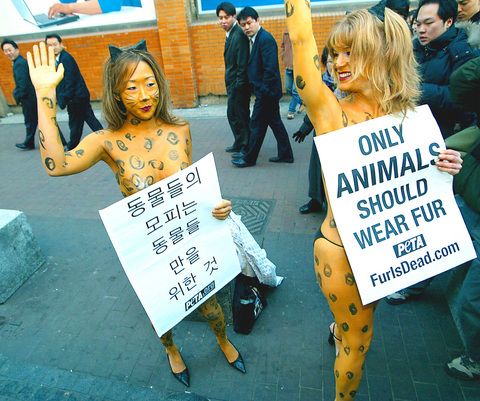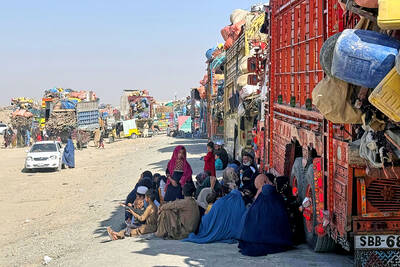Sultry animal rights activists stripped down in the freezing weather to bare their skin on Friday to try to save the hides of millions of animals slaughtered for fur garments.
Wearing nothing more than flimsy underwear, painted-on leopard spots, cat's ears and carrying a banner reading "Only Animals Should Wear Fur," two young women from the People for the Ethical Treatment of Animals (PETA) marched down the street at the busy commercial block of Myeongdong.

PHOTO: REUTERS
A crowd of curious, mostly male onlookers feasted their eyes on the activists who braved the numbing winter weather to show their skins and shout slogans.
But several plainclothes policemen quickly forced their way through the group, wrapped the two naked women with blankets and overcoats and dragged them to a nearby police station.
The two were then charged with "indecent exposure" and ordered to appear before court where they will likely be fined, said Lisa Franzetta, one of the two protestors and the coordinator of PETA's international "Anti-Fur" Campaign.
"People just need to know if they are buying fur coats ... that animal was either electrocuted, or poisoned or had their neck broken simply for the sake of fashion," she said.
"We know when the Korean people become more aware of the really incredible suffering and violence behind the fur industry, they will reject fur. That's why we were out there showing some of our own skin today in the hopes that it will help save the skins of the millions of animals," she said.
Traditionally, North America, Western Europe, the Nordic countries and Russia have been the major markets for fur garments.
But because of the declining fur industry's desperate efforts to create new markets, sales of furs have expanded to South Korea, China and Japan, PETA said.
"With today's toasty and fashionable synthetics, there's no excuse to wear fur," said Christina Cho, who took part in the protest with Franzetta.
Sales of fur garments in South Korea had been increasing until the economy fell into a slump in 2003. At that time annual sales were roughly estimated at US$400 million.
"Differently from those in Europe, clients in South Korea are not affected much by anti-fur campaigns as the winter here is too cold to reject fur coats," said Han Sang-hoon, a manager of Jindo Corp, a leading fur coat maker in Seoul.
South Korea was the last leg of PETA's Asian campaign which also took the activists to Japan and China.
"This is the first anti-fur protest in South Korea but certainly it won't be the last," Franzetta said.
Meanwhile, South Korea's deputy prime minister in charge of education stepped down on Friday amid allegations of unethical conduct after serving in his post for only three days.
Civic groups have accused Lee Ki-jun, a former president of Seoul National University, of spending school funds improperly and hiding real estate assets under his son's name.
``I think the problems surrounding me are causing too big a burden for the president and people,'' Lee said in a statement he read before reporters. He didn't take questions.
Lee was appointed by President Roh Moo-hyun on Tuesday, and took office the following day.
There was no immediate comment from Roh's office, which faced criticism that it failed to review Lee's record thoroughly before his appointment.

With much pomp and circumstance, Cairo is today to inaugurate the long-awaited Grand Egyptian Museum (GEM), widely presented as the crowning jewel on authorities’ efforts to overhaul the country’s vital tourism industry. With a panoramic view of the Giza pyramids plateau, the museum houses thousands of artifacts spanning more than 5,000 years of Egyptian antiquity at a whopping cost of more than US$1 billion. More than two decades in the making, the ultra-modern museum anticipates 5 million visitors annually, with never-before-seen relics on display. In the run-up to the grand opening, Egyptian media and official statements have hailed the “historic moment,” describing the

SECRETIVE SECT: Tetsuya Yamagami was said to have held a grudge against the Unification Church for bankrupting his family after his mother donated about ¥100m The gunman accused of killing former Japanese prime minister Shinzo Abe yesterday pleaded guilty, three years after the assassination in broad daylight shocked the world. The slaying forced a reckoning in a nation with little experience of gun violence, and ignited scrutiny of alleged ties between prominent conservative lawmakers and a secretive sect, the Unification Church. “Everything is true,” Tetsuya Yamagami said at a court in the western city of Nara, admitting to murdering the nation’s longest-serving leader in July 2022. The 45-year-old was led into the room by four security officials. When the judge asked him to state his name, Yamagami, who

DEADLY PREDATORS: In New South Wales, smart drumlines — anchored buoys with baited hooks — send an alert when a shark bites, allowing the sharks to be tagged High above Sydney’s beaches, drones seek one of the world’s deadliest predators, scanning for the flick of a tail, the swish of a fin or a shadow slipping through the swell. Australia’s oceans are teeming with sharks, with great whites topping the list of species that might fatally chomp a human. Undeterred, Australians flock to the sea in huge numbers — with a survey last year showing that nearly two-thirds of the population made a total of 650 million coastal visits in a single year. Many beach lovers accept the risks. When a shark killed surfer Mercury Psillakis off a northern Sydney beach last

‘NO WORKABLE SOLUTION’: An official said Pakistan engaged in the spirit of peace, but Kabul continued its ‘unabated support to terrorists opposed to Pakistan’ Pakistan yesterday said that negotiations for a lasting truce with Afghanistan had “failed to bring about a workable solution,” warning that it would take steps to protect its people. Pakistan and Afghanistan have been holding negotiations in Istanbul, Turkey, aimed at securing peace after the South Asian neighbors’ deadliest border clashes in years. The violence, which killed more than 70 people and wounded hundreds, erupted following explosions in Kabul on Oct. 9 that the Taliban authorities blamed on Pakistan. “Regrettably, the Afghan side gave no assurances, kept deviating from the core issue and resorted to blame game, deflection and ruses,” Pakistani Minister of